Rudolf Serkin(28th Mar. 1903~8th May 1991)
[ The piano has always been less interesting to me than the music ]
Curriculum Vitae
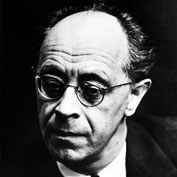 [ Photo from Philips Homepage ]
[ Photo from Philips Homepage ]
Many pianists begin as solist, but turn to other way(chamber musician or vocal accompanist) after they know the talent of their own are not proper to solist. The opposite cases are so rare, in which I think Rudolf Serkin perhaps succeeded most. Furthermore, he is one of the most outstanding example of a professional musical family in 20th century.
Rudolf Serkin was born in Eger(Bohemia? Austria?) on 28th March 1903 in a Jewish Russian family. He was taught music by father(singer) and moved to Vienna at nine, where piano by Richard Robert and composition by Joseph Marx(then George Szell was among his pupil, and the two musician cooperated in many recordings later in USA). Rudolf was hailed as a child prodigy as he played Mendelssohn's concerto with Vienna Philharmonic at twelve, but he started regular concert carrier in 1920.
It is said that his connection with Busch
family was in 1920, also. (I heard this story that) Adolf
Busch was seated at a concert by Rudolf. Busch was amazed
by Rudolf's gifts and tried to meet him so as to ask his
accompaniment, managing to meet Rudolf at train station
shortly before Rudolf's leaving because he was
disappointed by audiences' response. The two men, met by
accident, had played for 32 years. Rudolf gave the Berlin
début concert by Brandenburg Concerto with
Adolf conducting, which won the great applause from the
audiences. It is now legendary that the encore he played
was Goldberg variations. The best encore I have ever
heard, and perhaps worth while to being recorded in the
Guinness Book. (Another fairy-tale-like thing) when Rudi
was invited at Busch's home, Adolf's daughter Irene, only
at four, said "I'll marry 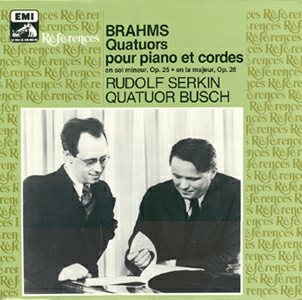 you after I am grown up". (Whether you
believe it or not) it was surely true she - also
violinist and played in her father's chamber ensemble -
married Rudi in 1935. Therefore, Adolf Busch(violinist),
his elder brother Fritz(famous conductor; 1890~1951),
younger brother Hermann(cellist; 1899~1972), Irene and
Rudolf, their son Shorn(hornist) and Peter(famous
pianist; 1947~ ) are most famous and strongest music
family in 20th century.
you after I am grown up". (Whether you
believe it or not) it was surely true she - also
violinist and played in her father's chamber ensemble -
married Rudi in 1935. Therefore, Adolf Busch(violinist),
his elder brother Fritz(famous conductor; 1890~1951),
younger brother Hermann(cellist; 1899~1972), Irene and
Rudolf, their son Shorn(hornist) and Peter(famous
pianist; 1947~ ) are most famous and strongest music
family in 20th century.
Adolf
Busch was highly acclaimed in Europe by noble and
well-structured playing and his fame grew widespread, and
as his constant accompanist, chamber musician of Busch
quartet, and solist of Busch chamber ensemble Rudolf
Serkin's fame also did. HMV contracted them for Brahms'
chamber music series, and recorded some works of
Beethoven, Schubert, and Schumann except Brahms from
early 1930s to 1939(some of the recordings done in 1949),
many of which are highly evaluated from now on. But his
Jewish blood was not overlooked by Nazi, so Serkin and
Busch family emigrated to USA through Swiss in 1939.
Rudolf took the post of Curtis Music Institute in the
same year, and settled at Guilford, Vermont. He founded
Marlboro(near Guilford) Music Festival with Adolf,
becoming the only leader after two years because of the
Adolf's death. Marlboro Festival is now one of the most
famous music festival in America, of which among the
regular member was many outstanding musicians like Pablo
Casals who was invited by Serkin himself. They say
artists liked the free atmosphere in this festival very
much.
Though he had already began solo recordings at Columbia from 1940s, he became well-known as solist after Adolf passed away on 1952. He concentrated on solo recordings after completing Beethoven's cello sonatas with Casals(1953). As far as I know, his studio recordings of chamber music except Marlboro lives after 1953 are only 4 works - quintets of Schumann and Brahms with Budapest String Quartet(1963), and Brahms' two cello sonatas with Rostropovich(1982). He toured all over the world, Europe, America, Asia(including Japan and Korea) and was evaluated as one of the supreme master of German classic and romantic repertoires. He finished his excellent career by playing Beethoven's "Emperor" with Cleveland Orchestra and Chicago Symphony in 1988. He died of cancer in May 1991 at his Guilford home.
Serkin said "Although I am pianist, the piano has always less been interesting to me than the music itself". When he was the faculty of Curtis, he stopped teaching to study Bach's cantatas for a year, from which we cannot but think that he was somewhat 'disinterested' in piano playing itself. (Therefore) the sound he produced is somewhat different from those of others. Besides his technical perfectness (even in later years), it is interestingly said his hands were far from the pianist's - looking clumsy and like those of physical laborer(see color photo below).
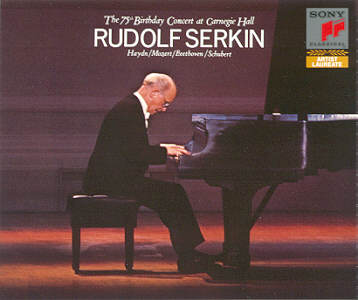 As far as listened by
records, his sound was transparent and not abnormal in
the ages of Busch's partner. But something was already
changed in the recording of Beethoven's cello sonatas -
to the keen sound of stereo era. It is truely amazing
that the most part of this set was recorded at 1953, only
one year after Busch's death. In the early 1960s, the
change had already finished. Of course there are some
differences in recording technique, but in comparing his
two recordings of Brahms' quintet - the old one with
Busch quartet(HMV, 1938) and the new one with Budapest
quartet(Sony, 1963) - we can easily know there are quite
many differences at piano sounds. The other sides, late
DG recordings show another sound - round and not keen,
similar to the early periods. Such changes are not
frequent in a pianist. At early years the sound
was toward chamber music - transparent and common,
altered to the one appealing his will(fit to the solo
works), and settled to tender and warm one.
As far as listened by
records, his sound was transparent and not abnormal in
the ages of Busch's partner. But something was already
changed in the recording of Beethoven's cello sonatas -
to the keen sound of stereo era. It is truely amazing
that the most part of this set was recorded at 1953, only
one year after Busch's death. In the early 1960s, the
change had already finished. Of course there are some
differences in recording technique, but in comparing his
two recordings of Brahms' quintet - the old one with
Busch quartet(HMV, 1938) and the new one with Budapest
quartet(Sony, 1963) - we can easily know there are quite
many differences at piano sounds. The other sides, late
DG recordings show another sound - round and not keen,
similar to the early periods. Such changes are not
frequent in a pianist. At early years the sound
was toward chamber music - transparent and common,
altered to the one appealing his will(fit to the solo
works), and settled to tender and warm one.
A Japanese critic said in his books,
"When we criticize Serkin, it will make many
mistakes to hear only his records without listening his
live concerts." He continued, "Serkin is very
sincere in recordings, therefore extremely concentrates
on texture and structures of the music, which makes many
differences between live and records." Critics say
"He moves strangely in concert, and pulsed the music
after his motion", and we can often hear his humming
habit even in records. As far as I listen his records, I
think his music is abnormally well-balanced, but
that his music often seems to break it. Beethoven's
'Pathétique'(Sony SBK 47666) gave me the impression,
pulsed and uncontrollable power under balance especially
in third movement. One of my seniors told me his Lugano
live(Ermitage ERM 110)
perfectly showed his uncontrolled face - almost
thundering piano. Anyway, his music is not apparently
sophisticated whether live or studio. So... my careful
suggestion is that Serkin's instinct is for freedom and
power, but that Adolf Busch's influence has him button
his instinct. Perhaps
there are violent collisions between his instinct and
balance, but he consciously tried to center the texture
because he pursues perfectness in recordings. Instead
that he gave up easy-listening and soft performance, he
chose strong tension and toughness, which had him
evaluated as virtuoso in Brahms and Beethoven. Other
composers are also fingerprinted by him, but not as
charming as the two B's. Schubert is recommended as the
next choice for Serkin.
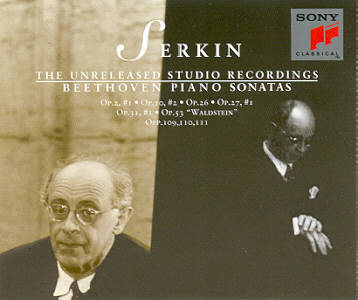 In his recordings, above
all, I recommend '75th anniversary concert'(Sony), which is one of his rare live
recordings. The program was Haydn, Mozart, Beethoven, and
Schubert, and very good performance - but not 'live
Serkin' yet. The style is settled down to that of the
recordings. In Beethoven sonatas including the three
famous one(No.8, 14, 23), 'previously unreleased
recordings(Sony)' is very good. No.30~32 are recorded in
his peak time, and first issued items are No.1, 6, 12,
13, and 16. The next is 'Hammerklavier(Sony)'. I think it's a representive in
stereo era - monaural Backhaus with intrepid spirit, and
most beautiful Gilels in digital era. In the concerto
recordings, Brahms' two works with Szell/Cleveland(Sony) are best. Solid technique and
large scale are evident, and moreover Szell's conducting
is supreme(and, budget price!). These are necessary
choices. One more is Schubert's sonata No.20(Sony), which shows intense and
impressive expression.
In his recordings, above
all, I recommend '75th anniversary concert'(Sony), which is one of his rare live
recordings. The program was Haydn, Mozart, Beethoven, and
Schubert, and very good performance - but not 'live
Serkin' yet. The style is settled down to that of the
recordings. In Beethoven sonatas including the three
famous one(No.8, 14, 23), 'previously unreleased
recordings(Sony)' is very good. No.30~32 are recorded in
his peak time, and first issued items are No.1, 6, 12,
13, and 16. The next is 'Hammerklavier(Sony)'. I think it's a representive in
stereo era - monaural Backhaus with intrepid spirit, and
most beautiful Gilels in digital era. In the concerto
recordings, Brahms' two works with Szell/Cleveland(Sony) are best. Solid technique and
large scale are evident, and moreover Szell's conducting
is supreme(and, budget price!). These are necessary
choices. One more is Schubert's sonata No.20(Sony), which shows intense and
impressive expression.
In
chamber musics, the quintets of Brahms and Schumann with
Budapest quartet are first recommended recorded at
Guilford in 1963, considering sound quality. He had
already recorded these works with Busch quartet, but in
the new recording (comparing Brahms) we can hear Serkin's
assertion more clearly than the old one. Beethoven's
complete cello sonatas with Casals(Sony) are impressive
in passionate playing, and Brahms'
two cello sonatas with Rostropovich(DG) show his refined
music in late years. The recordings with Adolf Busch are
now historical and I think Busch is the musical leader in
any repertoire. Brahms' quintet and quartet No.1 are the
best(all EMI), but the later from EMI international has
too serious problem to recommend. See my 'Record
Error' section of Brahms.
To name other recordings as long as
possible, Beethoven's complete concertos in monaural
era(with Ormandy/Philadelphia), stereo era(with
Bernstein/NYP & Ormandy/Philadelphia), and digital
era(with Ojawa/Boston Symphony). By CD, Telarc release is
available. If you do not mind 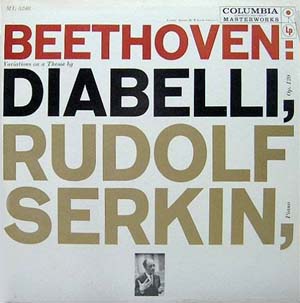 LPs, two Columbia recordings are cheap so
far. Brahms' concertos were recorded two times before the
recording with Szell - Szell(no.1; 1952) and
Ormandy(no.2; 1956, stereo in 1960/61). Most of Mozart's
concertos after No.9 were recorded with Szell, Ormandy,
Alexander Schneider(famous as second violinist of
Budapest quartet) at Sony, and with Abbado/LSO(later DG)
which are available by 7-CD set now. In general, Sony
recordings are favored. Mendelssohn's concertos(with
Ormandy; especially popular in this work), Schumann,
R.Strauss(Burleske), and Brandenburg Concerto with
Busch's conducting(EMI) famous as historical performance.
In solo works, two recordings of Diabelli Variations
(studio recording by Columbia is monaural, while live by
BBC is stereo), Handel Variations and Reger's Bach
variations(CBS), Schubert's Impromptus D.935(CBS), and
the only studio Chopin recording recently issued(op.28)
are interesting.
LPs, two Columbia recordings are cheap so
far. Brahms' concertos were recorded two times before the
recording with Szell - Szell(no.1; 1952) and
Ormandy(no.2; 1956, stereo in 1960/61). Most of Mozart's
concertos after No.9 were recorded with Szell, Ormandy,
Alexander Schneider(famous as second violinist of
Budapest quartet) at Sony, and with Abbado/LSO(later DG)
which are available by 7-CD set now. In general, Sony
recordings are favored. Mendelssohn's concertos(with
Ormandy; especially popular in this work), Schumann,
R.Strauss(Burleske), and Brandenburg Concerto with
Busch's conducting(EMI) famous as historical performance.
In solo works, two recordings of Diabelli Variations
(studio recording by Columbia is monaural, while live by
BBC is stereo), Handel Variations and Reger's Bach
variations(CBS), Schubert's Impromptus D.935(CBS), and
the only studio Chopin recording recently issued(op.28)
are interesting.
Serkin was very sincere artist in many respect. Andras Schiff says he learned much how to interpret the scores from him. Columbia planned to record Beethoven's complete sonatas by Serkin, but in vain(Sony was surely unlucky in the project. Gould's are imperfect, also. I think Perahia will). I heard the behind stories; In early 1950s, at a Beethoven sonata session Serkin was too serious and perfect, so Columbia technicians had to take the longest time in Columbia's history. They had no choice to give the project up as they thought it would not be sufficient even to spend all the lifetime of Serkin.
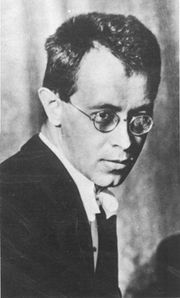 |
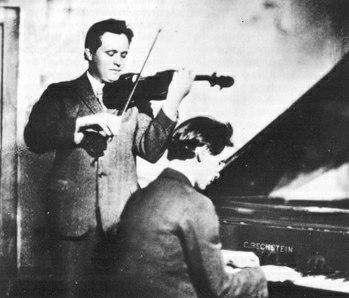 |
| * Young age(ca. 1938) | * with Adolf Busch(ca. 1931, EMI CDH 7 64495 2) |
 |
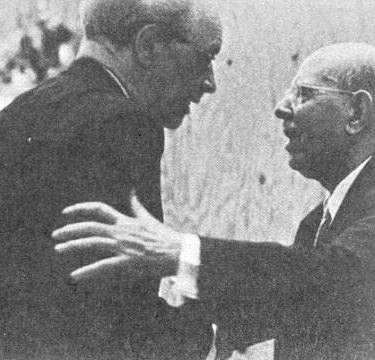 |
| * ca. 1977(from Sony Classical SRCR 8585) | * with Pablo Casals(from Ma vie racontée à A.Kahn, by Casals) |
The Resources
- Main ; an appendix of Eumak-Donga(a Korean music magazine), my records.
- photo of young Serkin - EMI LP 2C 051-34013
- Philips Classics ; The 20th century pianists
(c) 2000~ , Youngrok LEE ; Link free, but please get my approval before you reuse, copy, or quote this materials.
Created ; 25th Dec. 2000
(Original
Korean text created ; 10th Nov. 2000)
Last Update ;
8th Nov. 2008